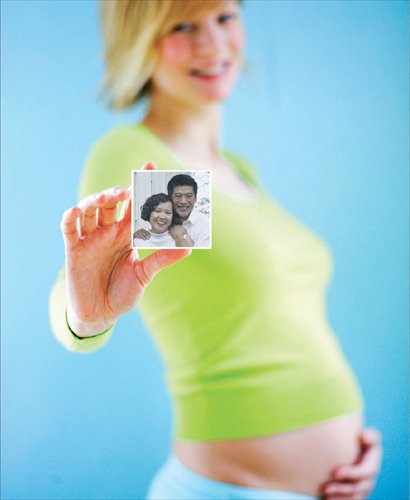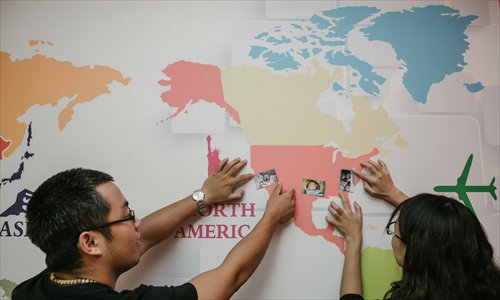Rent-a-womb
Why wealthy Chinese couples are traveling to America to hire surrogates

Surrogacy is illegal in China, so hiring a surrogate in the US has become an increasingly popular choice among wealthy Chinese couples who can't conceive. Photos: IC
Tony Jiang struggled to hold back the tears when he heard over the phone that there were "two very strong heart beats."
As one of the most important moments of his life, Jiang still vividly remembers the international phone call three years ago, between him and his American surrogate Amanda, who gave birth to his 4-year-old daughter, and 2-year-old twins, a boy and a girl. "I told her 'you helped a family who can't conceive to have three children, I'll be grateful for my whole life.'"
This unusual bond and friendship Jiang has formed with the surrogate mother of his children, is becoming more common. Surrogacy is illegal in China, but still many Chinese couples want to conceive their children this way for multiple reasons, such as, they have been battling infertility for a while; they are homosexual couples; they can't have more children without violating China's one-child policy.
More well-off couples are now going to the US to hire surrogates, cultivating a new and rising industry between the countries.

Although hiring a surrogate in the US costs at least $120,000, many Chinese couples prefer this option over Thailand, India or other countries, because of the advanced medical technology there. Photo: Li Hao/GT
The surrogacy process
Toward the end of 2010, Jiang and his wife Cherry traveled to the US, when Amanda was 38 weeks pregnant with their first child.
Outside the delivery room, Jiang thought about the last three years they had been battling infertility. They had consulted countless medical experts, and they had even talked to some illegal domestic surrogacy agencies.
Even after making the decision to travel to the US for surrogacy, they had to go through an expensive and complicated procedure, with piles of paperwork in English and multiple trips to the US, to make it happen. They also needed to meet the surrogate mother, lawyers and doctors, go through physical and psychological evaluation as well as an egg extraction procedure, and arrive in the US well ahead of the expected delivery date.
Jiang's eldest daughter attends an international school. He doesn't shy away from the fact that she's a surrogate baby, and plans to tell her everything when she's 18. "Knowing Dad and Mom went through so much to have her, we hope she'll treasure her own life more."
To help other Chinese couples with similar problems, Jiang started offering his consultancy services in 2010. He eventually started Diyi Consulting in Shanghai in 2012, which connects Chinese couples with reproductive healthcare institutions in the US.
He has handled more than 200 cases, with the majority of couples from Beijing. About 80 percent of them used eggs, sperm or embryos donated by other people, and most of them used surrogates to give birth to the babies.
Some are gay or lesbian couples, and some are single women who don't want to be discriminated against for falling pregnant out of wedlock. But the majority are couples unable to conceive.
A route for the rich
Surrogacy is a time- and money-consuming mission. The time span for having a surrogate baby varies from 11 months to four years through Jiang's agency. The couples need to pay lots of money - for medication, lawyers, insurance and agents. Jiang said the total cost is at least $120,000, excluding travel expenses or afterbirth care.
"But it's not like you can just hire a surrogate because you have the money. The American [agencies] will evaluate the social, physiological and medical reasons that you list in applying for surrogacy."
Jiang stressed that he has a screening process, where he talks to couples to learn about their situation and reasons for wanting to choose this route, before presenting their file to an American agency. He has rejected many couples who thought money was a quick fix for anything they wanted. "Many clients will say things like 'I am too busy to give birth to kids.' If you are so busy, why do you even want a kid at all?"
Mario Caballero, executive director of Extraordinary Conceptions in California, says that around 60 percent of his business comes from China.
His surrogacy agency, one of the largest in the US, connects doctors, lawyers, surrogates and parents-to-be. "We take on probably eight to 10 new couples a month who actually go through the process [of having a baby through surrogacy]," he said.
Caballero travels to China often, where he meets with clients privately as well as medical experts and middle agents. He not only consults in Beijing and Shanghai, but has also been to second-tier cities where wealthy Chinese people are learning more about this option. "In the last five years, there's been a steady growth. The last three years have seen an accelerated growth, because word has gotten to a lot people in China that they can have surrogates in the US."
Communication, such as people talking about it on WeChat, is one of the key factors that have contributed to such growth, said Caballero. "People in China are getting more information about cancer treatment, cosmetic treatment and other possibilities that they can get through medical tourism."
Choosing a country of birth
The surrogacy business has been growing greatly in the US over the past few years, and California is a popular choice.
The legalities of surrogacy in the US are complicated, and varies from state to state. Some states penalize commercial surrogacy, while others are much more surrogacy-friendly. Among them, California not only permits commercial surrogacy, but also makes it possible for the intended parents to establish legal parentage on paper, regardless of their marital status or sexual orientation.
"As soon as the baby takes its first breath, the names of the clients go on the birth certificate immediately," Caballero said.
Other surrogacy choices include Thailand, India and Russia, where the cost involved can be a lot less, but Chinese couples trust America's more advanced medical technology, laboratory management, the legal work and female social status, Jiang said.
Some middle-class couples would rather sell one of their real estate assets just to have more money available to go to the US, he added.
A clash of cultures
One of the difficulties in the surrogacy process is overcoming the cultural differences, said Jiang. He often needs to convince Chinese couples to trust the agent and the surrogate more. "You can't ask an American not to drink ice water. Some Chinese might ask their surrogates to lie in bed and not to move too much, which is impossible."
Others request that their surrogates have a Caesarian section, and want the baby to be born at a certain time of the day, said Jiang, so the baby's "shengchen bazi" (the birth date and the eight characters of a horoscope according to traditional Chinese beliefs), will be good.
Traditional beliefs also influence how the couples make decisions in other respects, too. For example, it's generally considered a bad year for a baby born in the Year of the Goat. "So this year, some people told me to freeze their embryos temporarily. On the other hand, the Year of the Dragon saw more parents-to-be."
Jiang said this kind of thinking is usually more common among those who want a second or third child. Those who can't conceive just want to have a baby as soon as possible.
Green card guarantee?
It has been reported that there are additional benefits to hiring an American surrogate: the couples can select the baby's sex; the baby automatically gets US citizenship, and can eventually sponsor his or her parents for American citizenship upon reaching the age of 21.
While the debate over birth-right citizenship is still heated in the US, Jiang and Caballero said agents are not feeling much pressure on this issue.
Jiang thinks it's ridiculous to say couples' surrogacy choices are motivated by green cards. "Many of them are very rich, and have Canadian or Australian passports already. Why would they want to wait for two decades if they can do an investment immigration right now?"
Jiang said many Beijing couples prefer their babies to get a local hukou (household registration). "In Beijing, having a US green card doesn't get you into a good [public] school. Having a child is their ultimate goal, not getting a green card."
"China's legal system doesn't permit dual citizenship. So a surrogate child must give up American citizenship to get Chinese citizenship and a hukou," said Ye Wenbo, senior partner at Beijing Liang Gao Law Firm.
The regulations regarding assisted reproduction in China, as released by the Ministry of Health and the Family Planning Commission, state that "medical institutions and medical staff are not allowed to perform any kind of surrogacy measures," which makes both commercial surrogacy and private surrogacy illegal in China, said Ye.
However, due to an underground surrogacy market, surrogacy-related legal disputes still exist in China, most of which concern the validity of the surrogacy agreement and custody issues.
"Usually, domestic courts will find the surrogacy agreement invalid, but still order that the surrogate be financially compensated," he said. "With regard to custody, both the paternal relation between the biological parents and the child, and the possible emotional bonding that has taken place between the surrogate and the child, will be taken into consideration."
"The trend of going to the US for surrogacy stems from social and economic reasons," said Ye. "Relevant legislation is still lagging behind in China. We hope the authorities will soon enact related laws and judicial interpretation to guide and regulate surrogacy."